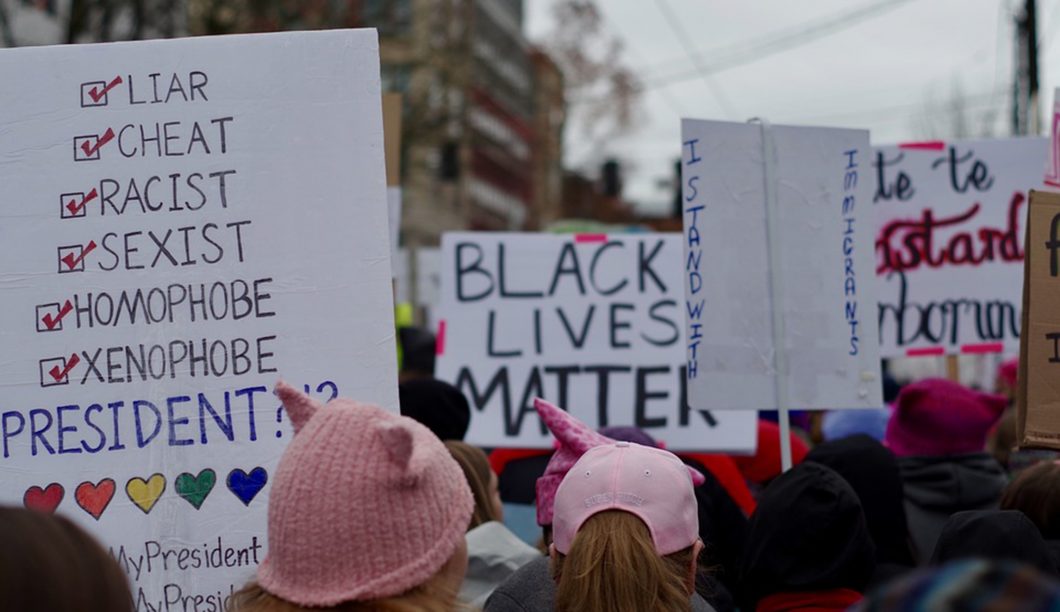Is Identity Politics a Capitalist Plot?
Modern American socialism faces certain tensions within itself, certain contradictions. Earlier this week I mused over American socialists who ran away from the proposal that “economic security” should be provided to those “unwilling to work”—no doubt because of the fabulous unpopularity of the proposal. Nonetheless, while notable socialist politicians and advocates distanced themselves from the proposal, in fact, major currents of traditional socialist thought aim precisely to delink work from reward. Doing so, the argument goes, actually liberates people to engage in truly rewarding work. In this more-radical socialist view, economic inequality is merely the symptom of the underlying disease of capitalism and private property.
So, too, the linking of identity politics in the U.S. with socialism might introduce another tension, another contradiction. Marxian socialism, at least, could view the sort of criticisms we’ve seen heaped on Bernie Sanders for running “too white” of a campaign, as hindering achievement of authentic socialist objectives rather than promoting them.
A critical feature of the socialist project, in this view, is the homogenization of all classes. (Capitalists are of course excluded, but even the capitalist class shrinks as market competition presses more and more capitalists into the class of proletarians). Contending identities are, and must be, dissolved in order for the unique, universal consciousness to develop in, as it were, this last classless class.
For example, in his Critique of Hegel’s ‘Philosophy of Right,’ Marx lays out the fundamentally unique character of the proletariat:
A class must be formed that has radical chains, a class in civil society which is not a class of civil society, a class which is the dissolution of all classes, a sphere of society which has a universal character because its sufferings are universal, and which does not claim a particular redress because the wrong which is done to it is not a particular wrong but a wrong in general. (Emphases in original.)
The universal, or homogeneous, experience of the proletariat in turns serves to achieve universal liberation:
There must be formed a sphere of society . . . which cannot emancipate itself without emancipating itself from all the other spheres of society, without, therefore, emancipating all these other spheres, which is, in short, a total loss of humanity and which can redeem itself by a total redemption of humanity. This dissolution of society, as a particular class, is the proletariat. (Emphases in original.)
The assertion of common or “universal grievances” is essential to the possibility of universal redemption. Hence, a traditionally common explanation of racism in the United States is that it served the interests of capital by keeping labor divided.
There is almost certainly some truth in that, although I suspect collective action problems deter the full realization of class interests even among capitalists. Indeed, even Marxists wouldn’t object to applying postulates of individual self-interest to the behavior of capitalists themselves. The prediction would be that individual capitalists free-ride on the divisive efforts of other capitalists. As a result, capitalists actually would invest less in achieving their overall class interests than would be optimal for their class. (In contrast, Marx presumably suggests that the class dynamic that creates the proletariat mutes the collective action problem for that class.)
Here’s the rub with this view regarding the ostensibly left-wing criticisms of the type of socialism Bernie Sanders represents: What is critical in preventing the rise of the proletariat is division between putative proles—division between races, sexes (and genders), religions, and more. In this view, encouraging white racism is only one means capital need employ to the end of keeping the proletariat divided. As the first passage above from Marx suggests, claims of “particular redress” for “particular wrongs” prevents the formation of common or universal identification. By deterring the formation of consciousness of the universal class it deters the formation of the proletarian class itself.
Marx’s criticism of “particularism” raises the possibility that, on Marxian terms, the interests of capital can be as easily advanced by facilitating consciousness of “particular” wrongs among different oppressed groups, with the possibility that these distinct claims would receive “particular redress.” Of interest, is that possible “redress” of past wrongs would seem to be as divisive to the formation of the universal class as offering special privileges to other groups. What matters is the division itself, not the source of the division.
As with the emphasis of America’s socialist-lites on the terms on which people labor rather than the transformation of the labor relationship itself—thereby internalizing fundamental “neo-liberal” postulates while saying they reject it—so too with the embrace of identity politics. It would seem on socialist terms to prevent the achievement of fundamental socialist aims rather than to advance them.



